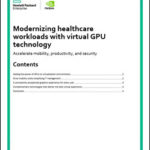In this video, Mike Adams, VMware’s Senior Director CPBU, AI/ML Market Development, talks with us about a new, integrated VMware vSphere 7 feature enabling “elastic infrastructure” on-demand for AI and machine learning. VMware vSphere Bitfusion is a result of VMware’s 2019 acquisition of Bitfusion, developer of virtualized hardware accelerators, including GPUs, used to improve performance of AI/ML workloads.
VMware to add BitFusion GPU Virtualization to HPC Capabilities
In this video from SC19, Mohan Potheri from VMware describes how virtualization makes HPC users more productive. “High Performance Computing workloads are forecasted to be one of the fastest-growing workload types through 2020. With VMware, you can capture the benefits of virtualization for HPC workloads while delivering performance that is comparable to bare-metal. Our approach to virtualizing HPC adds a level of flexibility, operational efficiency, agility and security that cannot be achieved in bare-metal environments—enabling faster time to insights and discovery.”
Modernizing Healthcare Workloads with Virtual GPU Technology
In the healthcare sector, clinicians are increasingly using mobile devices such as smartphones, tablets, and personal laptops to access patient records and more. Many hospitals have turned to virtualization and virtual GPU technology to offer greater mobility, security, and IT manageability. Download the report from HPE that explores how virtual GPU technology is modernizing healthcare.
Achieving Near-Native GPU Performance in the Cloud
“In this session we describe how GPUs can be used within virtual environments with near-native performance. We begin by showing GPU performance across four hypervisors: VMWare ESXi, KVM, Xen, and LXC. After showing that performance characteristics of each platform, we extend the results to the multi-node case with nodes interconnected by QDR InfiniBand. We demonstrate multi-node GPU performance using GPUDirect-enabled MPI, achieving efficiencies of 97-99% of a non-virtualized system.”







